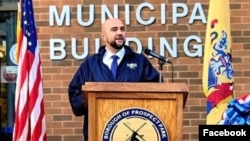A New Jersey mayor barred from a White House event earlier this year is among a dozen Muslim Americans suing the U.S. government over its continued use of a terror watchlist created after the attacks of Sept. 11, 2001.
Mohamed Khairullah, the five-term mayor of Prospect Park, New Jersey, was invited along with other Muslim elected officials to attend an Eid celebration at the White House in May but was told shortly before the event that he wouldn't be allowed to enter the compound.
The Secret Service did not explain why it turned him away but a new lawsuit brought by Khairullah and 11 others claims he was barred because his name was on the terror watchlist between 2019 and 2022.
"After approximately August 2022, after Defendants removed Mr. Khairullah from the watchlist, they continued — and continue, to this day — to retain records of his past watchlist status and use them to harm and stigmatize him," the lawsuit says.
The lawsuit was filed by the Council on American-Islamic Relations, a Muslim advocacy group, against 29 federal agencies, including the Justice Department, the FBI, the Secret Service, Customs and Border Protection, and the Transportation Security Administration.
The lawsuit alleges that the plaintiffs, including eight U.S. citizens, three permanent residents, and one asylum recipient, were placed on the list because of their religion.
"All of them have been placed on the federal watchlist even though they have never been investigated or convicted of a terrorism-related crime and even though the federal government has no reason to suspect that they're terrorists except for their Muslim faith, their Muslim sounding names, their countries of origin from Muslim-majority countries and other markers of their identity as Muslims," CAIR lawyer Hannah Mullen said in an interview with VOA.
U.S. officials view the watchlist as a vital security tool and deny using it to target Muslims. They note that only a fraction of the names on the list belongs to Muslim Americans.
The FBI says the list includes "people reasonably suspected to be involved in terrorism or terrorism related activists" and that sharing the list with other agencies "keeps the American people safe."
The Secret Service said it does not comment on pending or proposed litigation. But in a statement to VOA, a spokesperson for the agency said, "As we stated in the past, we were not able to grant entry to the Mayor at the White House and we regret any inconvenience that may have caused."
The Justice Department and the FBI declined to comment citing the pending litigation.
The Department of Homeland Security did not immediately respond to a request for comment.
The lawsuit wants the U.S. District Court in Boston, where the complaint was filed, to order the government to remove the plaintiffs' names and institute changes to ensure the list is in compliance with the Constitution and the law.
The case comes on the anniversary of a 2003 presidential directive that established the Terrorist Screening Center, an FBI-run outfit that maintains the Terrorist Screening Dataset, colloquially known as the watchlist.
The watchlist includes more than 1.5 million names of what the government calls "known or suspected terrorists.”
It has two subsets known as the "No-Fly List" and the "Selectee List" that federal agencies use to screen air travelers.
The No-Fly List consists of the names of about 80,000 people who are barred from air travel within, to and from the United States. The smaller Selectee List includes people who are subjected to enhanced screening at airports before they are permitted to board an aircraft.
The consequences of being placed on the watchlist are not limited to airport hassles. They include being denied jobs, security clearance, U.S. citizenship, visas, gun licenses, and other government benefits, the lawsuit says.
What is more, even when the FBI drops someone from the list, as it allegedly did with Khairullah, the agency retains the person's information in its database, the lawsuit says.
This information can then be used by various agencies to vet the person for access to federal buildings, jobs and programs, as well as for background and security checks, according to the lawsuit.
Mullen said that it was “extraordinary” that a person who was no longer deemed a threat by the government can still face harm and stigma because of their past inclusion in the list.
Khairullah “is certainly not the only person in this circumstance, and he's certainly not the only person of which we’re aware who appears to have been harmed by past watchlist status,” Mullen said.





